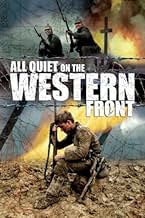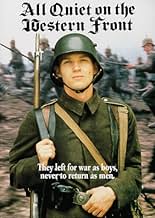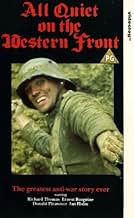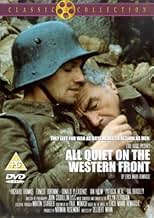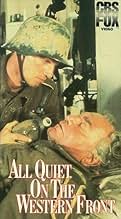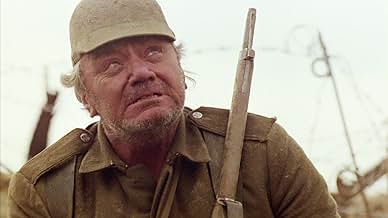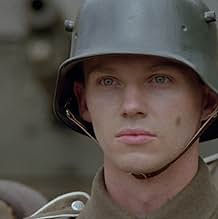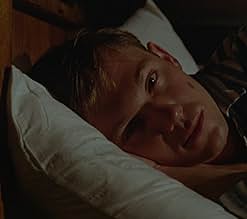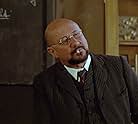CALIFICACIÓN DE IMDb
7.1/10
11 k
TU CALIFICACIÓN
Agrega una trama en tu idiomaA young soldier faces profound disillusionment in the soul-destroying horror of World War I.A young soldier faces profound disillusionment in the soul-destroying horror of World War I.A young soldier faces profound disillusionment in the soul-destroying horror of World War I.
- Dirección
- Guionistas
- Elenco
- Ganó 1 premio Primetime Emmy
- 2 premios ganados y 6 nominaciones en total
Paul Mark Elliott
- Josef Behm
- (as Mark Elliott)
David Bradley
- Albert Kropp
- (as Dai Bradley)
Matthew Evans
- Friedrich Muller
- (as Mathew Evans)
Marie-Noëlle Barre
- French Girl
- (as Marie Noelle-Barre)
- Dirección
- Guionistas
- Todo el elenco y el equipo
- Producción, taquilla y más en IMDbPro
Opiniones destacadas
The film is an excellent remake. Though in some ways it doesn't live up to the 1930 original, there are some other ways in which I think it is more effective. I particularly like the portrayals of Himmelstoss and Kat; Ernest Borgnine is outstanding in his role. Changes to the original are minor - Paul, for example, as an artist, drawing a bird in the final scene rather than reaching for a butterfly - and do not in any way detract from the power of Remarque's story.
Although the film, as released on video, is very good, it could still be made better...because...
I taped the program off of CBS when it ran on the "Hallmark Hall of Fame" in 1979 or 1980. The commercially available version leaves out some scenes which aired in the original broadcast. Himmelstoss, for example, DID appear as the postman in a street scene as the boys leave school. Unfortunately, this was apparently cut when the film was released on video. This film is actually somewhat better in its original, on-air form than on video...and if anyone associated with the current production rights read this, PLEASE restore it! After 22 years, the quality of my recording is declining markedly, but I don't want to lose the narrative quality of the film.
Although the film, as released on video, is very good, it could still be made better...because...
I taped the program off of CBS when it ran on the "Hallmark Hall of Fame" in 1979 or 1980. The commercially available version leaves out some scenes which aired in the original broadcast. Himmelstoss, for example, DID appear as the postman in a street scene as the boys leave school. Unfortunately, this was apparently cut when the film was released on video. This film is actually somewhat better in its original, on-air form than on video...and if anyone associated with the current production rights read this, PLEASE restore it! After 22 years, the quality of my recording is declining markedly, but I don't want to lose the narrative quality of the film.
This version may not be as good as its great predecessor, but it's definitely a fine show on its own. Richard Thomas is very good, if about ten years too old, as the central character, Paul Baumer, who grows from glory seeking school boy to crusty veteran to, finally disillusioned, weary, almost hopeless pawn. Ernest Borgnine is terrific as Kat, the cagey survivor, who takes the youngsters under his wing, teaching them ways to make trench warfare almost tolerable. Ian Holm has a nice turn as Paul's town's postman turned training NCO, who later is transferred to the trenches. The great actress, Patricia Neal, shines in a cameo as Paul's mother. Donald Pleasance is excellent as Paul's patriotic teacher who exhorts Paul and his classmates to enlist. Gradually the grinding attrition of war eliminates Paul's classmates and the old sweats, until the famous final scene, when so little happened that day that the war entry was "All quiet on the Western Front." Most of the scenes in the original are presented here, a few additions and a couple deletions. The color cinematography is nicely done. Well worth a look as either a comparison or companion to the 1930 original.
I remembered watching this film in college and got it for my daughter when she was studying WWI. This movie really took advantage of a great opportunity: Teaming Richard Thomas and Ernst Borgnine while they were both still young enough for the parts! Thomas is wonderful, as he always is; but it's Borgnine you remember most as the old soldier, Kat. It is a great story and very well-acted. Just an interesting aside is the appearance of Patricia Neal as the young soldier, Paul's, mother. Patricia Neal portrayed Olivia Walton in the pilot episode of THE WALTONS (THE HOMECOMING); so it was interesting to see she and Thomas as mother and son again. Definitely recommended.
The 1979 TV movie is true to the novel, whereas the 1930 movie is not, although they are both very powerful films.
I read All Quiet On The Western Front while serving in the U.S. Marines in Vietnam, 1966-1967. It is without question the greatest war novel ever written. It is the universal story of the "grunt", all those who have ever fought on the front lines and experienced battle and death. Remarque served in the German army and lived through the hells he describes. Do not mistake his plain style of writing for a lack of literary ability - his simple telling of the events is one of the things that make this book so great. For example, after the company has been called back to the rear for reinforcements, the captain calls the roll several times. Half of the names are not there - they are dead, wounded or missing. Paul (the story teller) says "A line, a short line, trudges off...". Remarkable, this terse imagery of the depth of violence that happened at the front. Another line comes from one of soldiers while discussing how to stop the war (referring to the generals and politicians): "Give 'em all the same grub and all the same pay, and the war would be over and done in a day." Still true today. When describing what happens to common men fighting for their lives in battle, Paul says: "...this wave..that..turns us into thugs, into murderers, into God only knows what devils...". As Colonel Kurtz would say: "The Horror, the horror". This novel will forever speak across the years for all soldiers in combat everywhere.
I read All Quiet On The Western Front while serving in the U.S. Marines in Vietnam, 1966-1967. It is without question the greatest war novel ever written. It is the universal story of the "grunt", all those who have ever fought on the front lines and experienced battle and death. Remarque served in the German army and lived through the hells he describes. Do not mistake his plain style of writing for a lack of literary ability - his simple telling of the events is one of the things that make this book so great. For example, after the company has been called back to the rear for reinforcements, the captain calls the roll several times. Half of the names are not there - they are dead, wounded or missing. Paul (the story teller) says "A line, a short line, trudges off...". Remarkable, this terse imagery of the depth of violence that happened at the front. Another line comes from one of soldiers while discussing how to stop the war (referring to the generals and politicians): "Give 'em all the same grub and all the same pay, and the war would be over and done in a day." Still true today. When describing what happens to common men fighting for their lives in battle, Paul says: "...this wave..that..turns us into thugs, into murderers, into God only knows what devils...". As Colonel Kurtz would say: "The Horror, the horror". This novel will forever speak across the years for all soldiers in combat everywhere.
This is a very good anti-war movie. It shows how the young and naive are being brain-washed to think that somehow it is their duty to kill and die. Big words like Fatherland, Kaiser, God, Patriotism. But it is always the young generation that does the dying, whilst the old men discuss strategy over a beer. War has lost whatever legitimacy it ever may have had when the leaders left the front line to lead from the back, safe in their headquarters miles away from the killing. Sending young boys to their death whilst claiming it is eventually for the Good is the ultimate cowardice. Some get their come-uppance, such as Cpl Himmelstoss, but most live their lives in the comfortable cocoon of their self-righteousness the school teacher, the father, the Kaiser himself.
But sometimes a young soldier sees through the scam, as when Paul kills a Frenchman by sheer instinct, only too late realising what he has been forced to do to someone who might have been his brother. But even then the cultural impregnation is too strong for him to follow his true human feelings and draw the only logical conclusion. And of course in the end he pays the price himself. Destroyed - for what?
That is the lesson that we all should take to heart, to this very day.
A very good film based on an exceptional book.
But sometimes a young soldier sees through the scam, as when Paul kills a Frenchman by sheer instinct, only too late realising what he has been forced to do to someone who might have been his brother. But even then the cultural impregnation is too strong for him to follow his true human feelings and draw the only logical conclusion. And of course in the end he pays the price himself. Destroyed - for what?
That is the lesson that we all should take to heart, to this very day.
A very good film based on an exceptional book.
¿Sabías que…?
- TriviaIn the scene of Kaiser Wilhelm II (Denys Graham) pinning medals on the soldiers, the Kaiser uses only his right arm and hand, while an aide holds the soldiers' tunics, an historically accurate detail, since the real Kaiser Wilhelm had a stunted and withered left arm that was virtually useless.
- ErroresThe Kaiser is not wearing the correct decorations. Apart from the fact that he is wearing ribbons rather than medals (Wilhelm II generally preferred medals to ribbons), one can actually see two of those ribbons sporting swastika-bearing eagles - clearly recycled props from a WW II movie.
- Citas
Paul Baumer: [to a dying Frenchman] If we threw away the guns, the grenades... We could have been brothers, but they never want us to know that.
- Versiones alternativasThe DVD release is the edited version which was shown in European theaters in the early 80s. Approximately 20 minutes of footage was cut from the original Hallmark Hall of Fame production which aired on American TV in 1979, including two scenes immediately following the award ceremony: the soldiers discuss the causes of the war in their billet while Himmelstoss listens in icy silence, and Paul and his friends admire and make lewd comments about a pretty girl on a theater poster. Also, the scene of Paul carrying the wounded Kat to the dressing station is greatly reduced, eliminating the rest stop and conversation in which Paul tries to give Kat his address.
- ConexionesEdited into Hallmark Hall of Fame (1951)
Selecciones populares
Inicia sesión para calificar y agrega a la lista de videos para obtener recomendaciones personalizadas
Detalles
- Fecha de lanzamiento
- Países de origen
- Sitio oficial
- Idioma
- También se conoce como
- All Quiet on the Western Front
- Locaciones de filmación
- Productoras
- Ver más créditos de la compañía en IMDbPro
Contribuir a esta página
Sugiere una edición o agrega el contenido que falta

Principales brechas de datos
What is the French language plot outline for Sin Novedad en el Frente (1979)?
Responda

